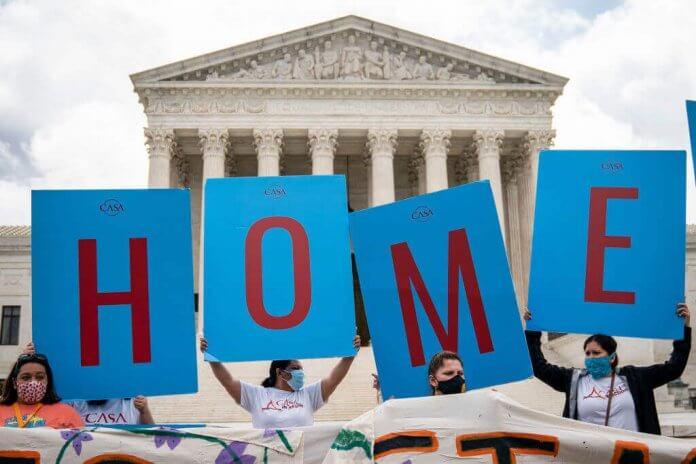
Caption
Georgia students who receive DACA could pay less for college under a bill that passed a key committee Thursday.
Credit: Georgia Recorder

Georgia students who receive DACA could pay less for college under a bill that passed a key committee Thursday.
Some Georgia college students who are protected by the federal Deferred Action for Childhood Arrivals program could soon pay tuition more in line with their classmates if legislation passed by the House Higher Education Committee on Thursday makes it into law.
But the bill’s sponsor didn’t secure as much parity for so-called Dreamers as he initially hoped.
“I’m happy with the way it turned out; It’s a compromise,” Dalton Republican Rep. Kasey Carpenter said. “And it’s still early in the game. If it passes out of the Senate, there will probably be more compromises, but you just have to move the ball forward.”
The proposal would give DACA Students, who were brought to the country as minors but are protected from deportation by an Obama-era policy, the ability to attend Georgia colleges for the same cost as other Georgians. They now pay out-of-state tuition, which can be more than three times higher than in-state tuition. There are about 21,000 DACA recipients living in Georgia.
The bill now contains more restrictions than a previous version Carpenter filed in January. In the revision, eligible students would be classified as “opportunity students” and pay a rate determined by their university or technical college ranging from 100% to 110% of regular in-state tuition.
An opportunity student’s tuition could increase during their time at school if the regular in-state tuition increased, but it would stay at the same proportion as when the student was accepted.
A previous version of the bill would have had those students pay the same as other Georgia residents.
“We wanted to give the university system some flexibility in the rates; we didn’t want anyone operating at a loss because of this opportunity tuition,” Carpenter said.
Universities would be required to give priority to qualified in-state students who are not opportunity students. And schools could defer the enrollment of qualified opportunity students until all applications from non-opportunity students are either accepted, deferred or rejected.
The version approved Thursday proposes to exempt universities that have not admitted all qualified applicants in the two most recent academic years, which would rule out the state’s most competitive colleges, including the University of Georgia and Georgia Tech.
“It’s really important for me to stress that this is about filling capacity and giving kids the opportunity with the areas that are under capacity,” Carpenter told the committee. “I do think it’s important to stress to folks that this is about schools with capacity.”
Last year, Carpenter was moved to tears when a similar effort to extend in-state tuition to DACA recipients stalled in a House committee.
Some advocates for immigrants said they’re happy at the prospect of college becoming more affordable for immigrant students but they’re hoping the final bill will be less restrictive.
“I’m excited about the potential impact the bill has while still hopeful for future amendments,” said LaVita Tuff, policy director of Asian Americans Advancing Justice-Atlanta, part of the Georgia Immigrant Rights Alliance, which has been lobbying for fair tuition for Georgia DACA recipients.
“We pushed to obtain a version of the bill that would be the least restrictive bill, that would eliminate language such as the type of institutions scholars would be able to attend,” she said. “After much work, we saw that line removed, while other lines regarding age and domicile remain. We hope to see additional changes in this legislation that continues to be a step in the right direction.”
A previous hearing on the legislation became heated when anti-immigration advocates took the podium to denounce the bill. Opponents said Carpenter’s legislation prioritizes people in the country illegally over natural-born citizens who live in other states.
Carpenter has also taken heat from members of his own community back home — the Whitfield County Republican Party’s Facebook page urged members to call committee members and vote against the measure. But Thursday’s meeting went off without fireworks, and despite no votes from several GOP members, Carpenter received praise from both sides of the aisle.
“It’s taken a lot of courage, a lot of guts, and you’ve had a lot of very unfair insults and unfair, blatant lies that have been thrown at you,” said Marietta Republican Rep. Bert Reeves. “This measure makes a tremendous amount of sense, and I just want to recognize the courage that I know that it has taken for you to bring this in, and it means a lot, I think, to all of us, and it’s inspiring.”
Carpenter will have to win over more of his Republican colleagues if the bill is to stay alive. It will have to pass the Rules Committee and the full House with its conservative majority by Monday, which is Crossover Day, the deadline for bills to pass from one chamber to the other without complicated legislative maneuvering.
Carpenter said he’s not making any predictions, but he’ll pitch the bill as a way to help children who have grown up in Georgia and were educated in the state’s public schools a chance to contribute more to the state’s economy.
“It’s just giving kids an opportunity when, clearly the federal government says they can be here, it’s giving them an opportunity to become more educated, pay higher taxes, give them more opportunity at the end of the day, and that’s what it’s about for me. It’s a workforce development issue, allowing taxpayers to pay taxpayer rates.”
This story comes to GPB through a reporting partnership with Georgia Recorder.